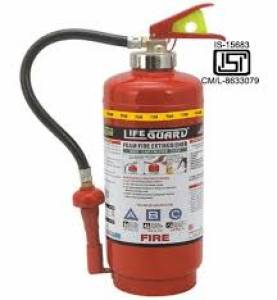Description
Water Type Fire Extinguishers: Your First Line of Defense Against Common Fires
Water type fire extinguishers are a reliable and cost-effective solution for combating Class A fires – those involving ordinary combustible materials like wood, paper, cloth, and some plastics. Understanding their capabilities and limitations is crucial for selecting the right extinguisher for your specific needs.
How They Work:
Water extinguishers work by cooling the burning material below its ignition temperature, effectively suppressing the fire. The water absorbs heat, converting it to steam, and disrupts the combustion process. The forceful spray also helps to disperse the burning material.
Key Features & Benefits:
- Effective on Class A Fires: Specifically designed for ordinary combustibles, offering a straightforward and effective fire suppression method.
- Cost-Effective: Generally less expensive than other extinguisher types, making them a budget-friendly option for many applications.
- Easy to Use: Simple operation makes them suitable for training and use by non-specialized personnel. (Always follow the instructions on the extinguisher label.)
- Environmentally Friendly: Water is a naturally occurring substance, posing minimal environmental impact compared to some chemical agents.
- Wide Range of Sizes: Available in various capacities, from small handheld units for homes and offices to larger wheeled models for industrial use.
Limitations:
- Ineffective on Class B, C, D, or K Fires: Do not use water extinguishers on flammable liquids (Class B), electrical fires (Class C), combustible metals (Class D), or cooking oil/grease fires (Class K). Using water on these types of fires can be extremely dangerous and may spread the flames.
- Potential for Water Damage: While effective, water can cause damage to sensitive equipment or materials. Consider this before deploying a water extinguisher.
- Can Conduct Electricity: Never use a water extinguisher on electrical fires – the water can conduct electricity, posing a serious risk of electrocution to the user.
- Requires Sufficient Water Pressure: Ensure the extinguisher is properly charged and maintained to guarantee effective operation.
Choosing the Right Water Extinguisher:
The appropriate size of water extinguisher depends on the potential fire risk in your environment. Consider factors such as:
- Size of the area to be protected: Larger areas require larger extinguishers.
- Type of potential fire hazards: Assess the types of combustible materials present.
- Occupancy of the area: Consider the number of people who might need to use the extinguisher.
Maintenance & Inspection:
Regular inspection and maintenance are vital for ensuring your water extinguisher is ready for use. This typically includes checking the pressure gauge, ensuring the nozzle is unobstructed, and scheduling professional servicing as needed. Refer to the manufacturer's instructions for specific maintenance requirements.
